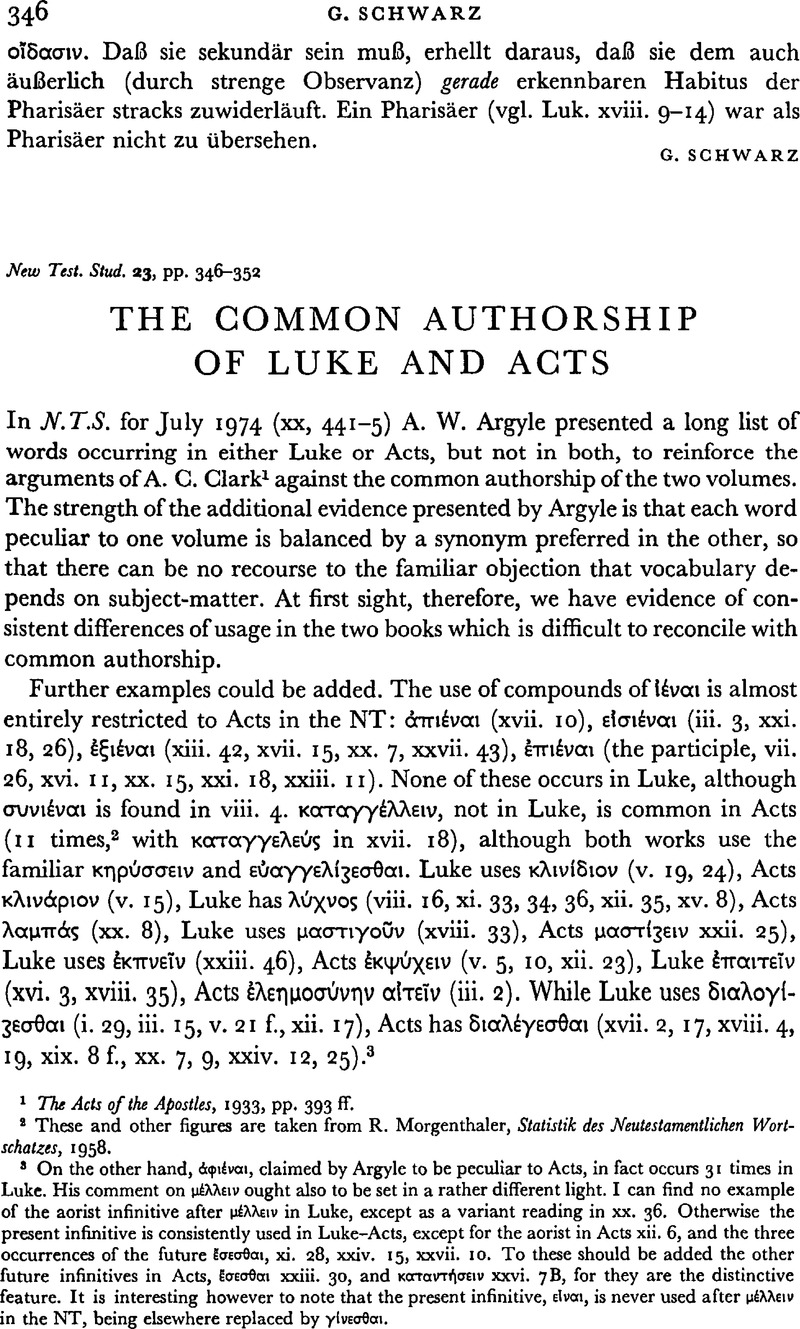Article contents
The Common Authorship of Luke and Acts
Published online by Cambridge University Press: 05 February 2009
Abstract

- Type
- Short Studies
- Information
- Copyright
- Copyright © Cambridge University Press 1977
References
page 346 note 1 The Acts of the Apostles, 1933Google Scholar, pp. 393 ff.
page 346 note 2 These and other figures are taken from Morgenthaler, R., Statistik des Neutestamentlichen Wortschatzes, 1958.Google Scholar
page 346 note 3 On the other hand, άφıέναı, claimed by Argyle to be peculiar to Acts, in fact occurs 31 times in Luke. His comment on μέλλεıν ought also to be set in a rather different light. I can find no example of the aorist infinitive after μέλλεıν in Luke, except as a variant reading in xx. 36. Otherwise the present infinitive is consistently used in Luke-Acts, except for the aorist in Acts xii. 6, and the three occurrences of the future έσεσθαı, xi. 28, xxiv. 15, xxvii. 10. To these should be added the other future infinitives in Acts, έσεσθαı, xxiii. 30, and καταντήσεıν xxvi. 7B, for they are the distinctive feature. It is interesting however to note that the present infinitive, ειναı, is never used after μέλλεıν in the NT, being elsewhere replaced by γινεσθαı.
page 347 note 1 Cf. Jackson, F. J. Foakes and Lake, K., Beginnings of Christianity, pt. I, vol. IV (1933), p. 334.Google Scholar
page 348 note 1 Knox, W. L., The Acts of the Apostles (1948).Google Scholar
page 349 note 1 In using this symbol I do not imply that there was necessarily a single lost source document behind Matthew and Luke.
page 349 note 2 It must always be remembered that in such discussions as this we frequently reach the boundary between habit and the requirements of subject-matter. καλ⋯ς occurs in Acts only in a proper name in 8, against 9 occurrences in Luke, but the simple fact is that Acts has very few words of moral approbation at all. χρηστ⋯ς (Luke twice) never occurs, and άγαθο⋯ς only 3 times ( Luke, 16).Google Scholar
page 349 note 3 Whether in vi. 21 Luke was following the same document as Matthew or an independent source, the similarity between the two shows the vocabulary to be traditional.
page 350 note 1 Cf. Cadbury's, H. J. remark, ‘Like the rest of us, [Luke] has the habit of soon repeating a word when he has once used it.’ The Making of Luke-Acts, 1958, p. 218.Google Scholar
page 350 note 2 See the example in Moulton, J. H. and Milligan, G., Vocabulary of the Greek Testament (1930), p. 551,Google Scholars. v. προσρήγνυμı.
page 352 note 1 Hawkins, J. C. suggested an interval between the composition of the two works (Horae Synopticae, 2nd ed. (1909), p. 180).Google Scholar
- 5
- Cited by




